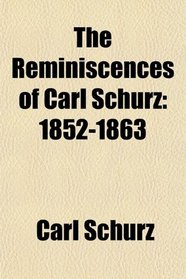Search -
The Reminiscences of Carl Schurz: 1852-1863
The Reminiscences of Carl Schurz 1852-1863
Author:
Purchase of this book includes free trial access to www.million-books.com where you can read more than a million books for free. This is an OCR edition with typos. Excerpt from book: tion of engravings. But there was little left of that revolutionary scheming and plotting to which the exiled had formerly given themselves, inspired by the delu... more »
Author:
Purchase of this book includes free trial access to www.million-books.com where you can read more than a million books for free. This is an OCR edition with typos. Excerpt from book: tion of engravings. But there was little left of that revolutionary scheming and plotting to which the exiled had formerly given themselves, inspired by the delu... more »
ISBN-13: 9780217607650
ISBN-10: 0217607659
Publication Date: 8/16/2009
Pages: 310
Rating: ?
ISBN-10: 0217607659
Publication Date: 8/16/2009
Pages: 310
Rating: ?
0 stars, based on 0 rating




